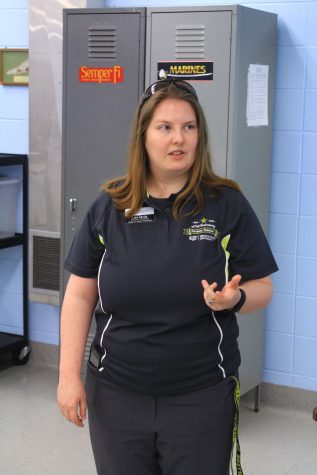Government shutdown affects WSU community
More than 800,000 government employees are furloughed due to the government shutdown, individuals and families across the country are forced to look for other work or dip into savings while they wait for Congress to find a solution.
This problem reaches into the Wichita State community as well, affecting professors and students.
Kendall Lundy is an adjunct professor of Biology at WSU and an Animal Care Inspector for the United States Department of Agriculture. His job entails enforcing federal standards on licensed facilities that are raising animals for wholesale, exhibition or research.
According to the federal government, his position is considered non-essential and is on furlough until the government is reopened.
Lundy said he was following the pre-shutdown negotiations closely but didn’t expect Congress to allow a shutdown.
“This last minute shuffling has occurred almost every year,” Lundy said. “I was expecting some last minute negotiations and it would all be good. It was more of a shock that it actually led to a shutdown.”
In order to supplement his income during the shutdown, Lundy said he might inquire about substitute teaching in the surrounding school districts.
Because of this and his job as an adjunct professor, Lundy isn’t worried about the salary.
“It’s not so much the salary,” he said. “It’s the benefits that would hurt.”
Lundy said that if the shutdown continues for much longer, his benefits will be lost and he will have to pay out of pocket for health insurance.
If he does have to pay for health insurance, Lundy said that although he doesn’t like how the Affordable Care Act has changed from what was originally proposed, he wouldn’t shy away from looking for benefits from the government.
“There are, no doubt about it, good benefits with the federal government,” Lundy said. “I’m pretty satisfied.”
Lundy said the shutdown is a mess on both sides of the political spectrum, but does think the Affordable Care Act should be fought because it was altered so much between conception and implementation.
During his free time, Lundy said that he will be working with his son at restoring an old Army Jeep and building a skeleton for one of the Biology classes he teaches.
“There’s never a lack of projects to keep me busy,” Lundy said. “The hardest part is not knowing. This could be solved today and we would go back to work Monday so it’s really hard to have any long-term plans.”
Another person affected by the shutdown is WSU Senior and Administrative Clerk for the U.S. Attorney’s Office, Ashley Petty.
Like Lundy, Petty said she was surprised that the shutdown happened.
“I didn’t really believe it because it’s happened before where they’ll be like, ‘prepare to be furloughed,’ and then you never get furloughed,” Petty said.
To take her mind off the work she can’t do, Petty has been spending the extra free time focusing on schoolwork and church activities.
“I’m just anxious because I know I have work to do and I can’t do it,” Petty said.
As far as income goes, Petty said she’s “blessed.”
“I was blessed in my final semester to receive a few different scholarships so I was able to put some money in savings,” she said. “As much as I don’t want to use my savings, I guess this is why you have savings, in case something like this happens.”
Like Lundy, Petty doesn’t blame either party more than the other. However, she is in favor of the Affordable Care Act and wishes “the Republicans would jump on board.”
“I think both sides are being stubborn,” Petty said. “I’m in favor of [the Affordable Care Act] so I guess I understand more why the Democrats are being stubborn.”
Overall, Petty hopes the shutdown ends soon.
“Unscheduled time off has been kind of nice, but I would like to go back to work,” she said.
Over the weekend, the U.S. House of Representatives unanimously passed a bill that would allow furloughed workers to be retroactively paid for the work they missed. However, this bill has yet to reach the Senate for consideration.









